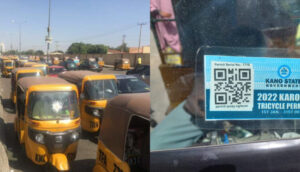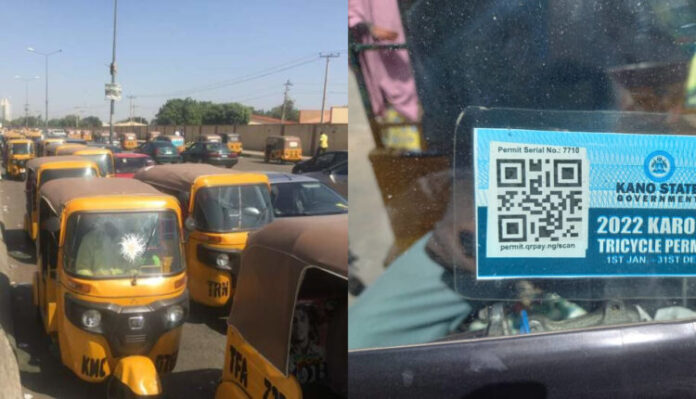How KAROTA allegedly scammed Kano tricycle operators ₦560m for digital trackers
In 2020, the Kano Road Traffic Agency (KAROTA), under the leadership of its former Managing Director, Baffa Babba Dan’agundi, unveiled a policy that promised to revolutionise the commercial tricycle business in Kano.
The initiative mandated all operators of Adaidaita Sahu, as the tricycles are locally known, to pay ₦8,000 each for GPS trackers designed to improve security, monitor their movement, and curb crime.
But SolaceBase has uncovered that instead of delivering on these promises, KAROTA issued operators nothing more than stickers, which many described as useless items that could neither track movements nor enhance safety, allegedly scamming over 70,000 tricycle operators amounting to more than ₦560 million.
The Adaidaita Sahu business, which blossomed after the ban on commercial motorcycles in 2013 following a terrorist attack on the late Emir, Alhaji Ado Bayero, provides a lifeline for over 100,000 Kano residents, including riders, owners, and mechanics. For these operators, the promise of security was irresistible. Many tricycle riders complied with the directive, believing the GPS trackers would protect their livelihoods, only to discover they had been duped.
It was uncovered that Dan’agundi’s orchestrations appear to be one of Kano’s most audacious alleged scams, defrauding struggling tricycle operators of millions of naira through a fake programme that swiftly became a nightmare of broken promises and unanswered questions.
Broken Promises, Shattered Trust
The alleged scam has left countless operators stranded, overburdened, and betrayed by a system they trusted. Many lack the education or resources to legally challenge the fraud, leaving them with no choice but to endure the exploitation.
Despite assurances that the trackers would curb crime, enhance public safety, and protect operators, none of these objectives have been achieved. Instead, the funds collected disappeared without accountability, and operators continue to face the same security challenges they hoped the programme would resolve.
Nura Abdurrazak, a tricycle operator from Kumbotso Local Government, said the tracker is just a sticker, not the digital device promised by the agency, adding that before they gave him the sticker, he had hoped that his tricycle would be well protected.

Read also: Leaked UN report exposes alleged failures, corruption in $1 billion oil spill project
“When I bought my tricycle, I went to the Kano Road Traffic Agency (KAROTA) to register my tricycle and obtain the tracker, as it has become law in the state that all of us must obtain it before we are allowed to operate in the state.
“I welcomed the idea because, for me, having a digital device in my tricycle is like hiring a guard to watch over it. I rushed to the agency and made my payment of 8,000 Naira. When they gave me this sticker as my digital device, I felt like crying.
“But you know how powerful the government is; if we refuse to comply with the directive, they will arrest us or ban us from operating. So I had no option but to collect it to avoid arrest by KAROTA personnel.”
This tricycle rider is one of the thousands of tricycle operators who bought their trackers with the good intention that it would provide security for their tricycles, but later on, they were allegedly betrayed and issued fake trackers.

Mukhtar Umar, another operator from Ungogo Local Government, shared similar sentiments, saying, “They assured us that the tracker would help them monitor us, find lost items, and reduce crime. But it’s all a scam. Crime is still rampant, and not a single criminal has been caught using this so-called tracker.”
“They told us that after we bought this tracker, it would be used to monitor our operations in the state. Even when a passenger forgets something in our tricycles, they would use the same tracker to track the tricycle and recover the items.
“Or if any operator commits a crime, they would use the tracker to arrest them. But to be frank with you, this is a scam. I have never seen any of this happen. A lot of crimes are committed in tricycles in Kano, starting with phone snatching, which is common, and armed robbery. But I have never heard that they arrested criminals through this fake tracker.”
Read also: OCRP: Stakeholders seek collective efforts to tackle corruption
Fear and Compliance: Trapped in a System
While operators understand that stickers are essentially meaningless, they feel trapped. Refusing to buy or renew one risks fines, arrest, and even damage to their tricycles by KAROTA personnel.
In this investigation, _SolaceBase_ discovered that if KAROTA personnel arrest an operator without the sticker, they embarrass and insult them. If they resist arrest, they have big sticks to damage the tricycle and detain such operator. The rider must pay a fine before securing the release of the machine.
Yusuf Nuhu, one of the operators from Gwale Local Government, bought it to operate in peace, not for protection.

“I just put this on for peace of mind, to do my operation in peace, but we know this is not a tracker. They deceived us. They just put this sticker to monitor who paid the money and who did not.
“The government is above all of us. If you refuse to buy it, you will be in great danger. So, I paid for it to have peace, but we all know the government is using us to generate unlawful money,” he added.
Sticker Theft: A New Struggle for Kano’s Tricycle Operators
Some tricycle operators, unable or unwilling to pay for the tracker programme, resort to stealing stickers from those who complied—a revelation that further highlights the fraudulent nature of the scheme.
Aminu Abdullahi, a tricycle operator from Taruni Local Government, fell victim to this practice when his sticker was stolen shortly after he paid the required ₦8,000 fee.
“Just a week after I put on my sticker, it disappeared. I have all the evidence of payment proving ownership of the sticker, but someone still decided to steal it,” Aminu lamented.
“You might find it strange that someone would steal a tracker. But since these stickers are fake, there’s no actual tracking involved. People steal them to avoid harassment or arrest by KAROTA officials.
“When KAROTA personnel see the sticker on a tricycle, they let you pass without asking for proof of payment. And if they do ask, bribing them a hundred naira usually resolves the matter,” Aminu explained.
This exploitation goes beyond theft. Many operators, wary of losing their stickers to thieves or seeing them damaged by water, refuse to paste them on their tricycles. Instead, they keep the stickers hidden and only reveal them when confronted by KAROTA officials at checkpoints.
Ahmad Muhammad, a resident of Gwale Local Government, shared his approach, “I’ve been carrying my sticker around since Baffa was the Managing Director of KAROTA. I never passed it because I didn’t want it stolen. Whenever KAROTA personnel stop me, I just show them the sticker, and they let me go. That was how I managed to avoid problems during his tenure.”

This widespread manipulation of the system underscores the programme’s failure. For tricycle operators, the stickers are less about enhancing security and more about navigating a corrupt and exploitative framework.
A False Sense of Security
The consequences of this scheme have been tragic. Operators like Muhammad Adam, who believed their tricycles were safe thanks to the “tracker,” were left devastated when they lost their vehicles to theft and found no support from KAROTA.

Adam, who parked his tricycle outside a mosque, only to find it missing after prayers, reported the theft to KAROTA. But despite his faith in the “tracker,” he received no help.
“I sold my farm to pay for this tricycle, only to lose it all. KAROTA has left us defenceless,” he lamented.
Ibrahim Ali Ibrahim from Kofar Nasarawa, Kano Municipal Local Government, is another tricycle operator whose tricycle was stolen, and the tracker did not help in finding it.
“My tricycle was stolen, and I went to the KAROTA office to report the issue. I gave them all my details and that of the tracker. They told me to go and that they would call me when they found it. To this day, they have never called me.
“I went back several times, but they kept saying they hadn’t seen it. That’s when I stopped going there. If it were a genuine tracker, they would have used it to find my tricycle. We will meet on the day of judgment.”
Tricycle Riders Unite: New Association Formed to Combat KAROTA’s Corruption
Nazifi D Gidan Kudi, chairman of the Voice of Tricycle Owners and Riders Association in Kano State, accused Baffa, the former managing director of using various tricycle associations to deceive the riders, noting that at the time, there was no single association representing tricycle riders in the state.
According to him, Baffa allegedly manipulated the association leaders to deceive their members, which led to the formation of a new association to fight for their rights.
“This issue of fake trackers arose from the corrupt practices of the past administration and our various unions. Baffa used them to act in his interest, not for the benefit of the members. That’s why we embarked on a seven-day strike to protest against KAROTA’s exploitation, imposing different taxes all the time. We did this without the support of the previous administration of our association, as they distanced themselves from the strike.
“KAROTA initially told us they would screen us, give us permits to operate, assign us numbers, and provide us with trackers. Baffa himself claimed that the money they charged us was cheaper compared to what the agency would spend on buying the trackers.
He claimed that if they collected ₦8,000 from us, the government would add more money to buy the digital trackers, adding, “Many cases were reported after they gave our members these trackers, but KAROTA did nothing.
“The money we paid was for the trackers, but they deceived us and gave us stickers instead. The government is powerful, and we cannot fight it and succeed. Our only option was to go on strike to protest against what they did to us.
“To be honest, Baffa used the leaders of our various associations to extort money from us. That’s why we have now formed this new association to fight for our rights. At that time, we had about eight associations, and he used them against us.”
The Toll on Public Safety and Crime Control
Beyond individual losses, the tracker programme has failed to curb crime in Kano, as originally promised. Phone snatchings, robberies, and assaults continue unabated, with criminals using tricycles to commit their crimes.
Isma’il Arzai, a resident, narrates a recent experience: “While stuck in traffic, I saw tricycle riders’ phones snatched by someone with long knives. This so-called tracker hasn’t helped catch anyone—it’s useless.”
As the sticker scheme fails to deliver any real protection, many tricycle operators and Kano residents are left with questions. If KAROTA intended to deter crime, why has nothing improved? Why are operators forced to pay for a sticker that does nothing to secure their tricycles or protect the public?

For Kano’s tricycle operators, this experience has turned a hopeful promise into disillusionment. They continue to work under the weight of unfair financial demands, feeling unsupported by the very agency meant to protect them. Many, like Ibrahim Ali from Kofar Nasarawa, await answers that have yet to come. “They promised us safety and gave us nothing,” he said. “One day, we’ll meet in court, if not here, then on Judgment Day.”
Read also: Clash between soldiers, tricyclists in Yobe leave 3 dead, several injured
Ex-Managing Director of KAROTA Responds to Allegations
The former Managing Director of the Kano Road Traffic Agency (KAROTA), Baffa Babba Dan’agundi, responded to allegations concerning the agency’s handling of trackers for tricycle operators during his tenure.
Addressing the matter, Dan’agundi stated that the promised trackers were indeed delivered to the tricycle operators, though the technology used was different from conventional systems.
“The trackers we provided were not like the ones people are familiar with. What some people call a ‘sticker’ was a tracker equipped with radio frequency technology. It served its purpose while I was in office.”
Dan’agundi claimed that the initiative was successful and achieved multiple objectives, including tricycle registration, movement monitoring, and revenue generation for KAROTA.
“We introduced the trackers to regulate tricycles in the state. They functioned as a form of tax collection and helped us monitor operations. The system generated significant income for the agency, and it was very effective,” he said.
He further detailed the technology used, clarifying that the trackers operated on radio frequency rather than requiring SIM cards. The tracking system was installed on major roads across Kano, including State Road, Club Road, Ahmadu Bello Way, Tarauni, Malam Aminu Kano Junction, Kabuga, Hadeja Road, Zoo Road, and other key locations. However, he noted that the system is no longer operational due to incidents of theft.
“The trackers were initially installed in collaboration with the Kano State Board of Internal Revenue, but I understand they are no longer in use because people started stealing them,” he added.
Read also: Gov. Buni warns against breach of peace as tricycle drivers protest extortion
Conflicting Statements from the Revenue Board
When contacted for clarification, the Kano State Board of Internal Revenue through the Public Relations Officer (PRO) of the board declined to comment, directing inquiries to the Congestion Charging Unit, which reportedly had information on the matter.
Sanusi Abdullahi, the head of the Congestion Charging Unit, refuted any collaboration between his unit and KAROTA regarding the trackers.
“Our unit never worked with KAROTA on trackers. We only collaborated briefly to collect daily taxes from motorists and tricycle operators, but that arrangement lasted just one month before Baffa Babba Dan’agundi took over the process entirely,” Abdullahi stated.
“As far as my office is concerned, there was no collaboration between us and KAROTA on the trackers. We have no knowledge of or involvement in their operations. KAROTA handled the tracker initiative independently.”
These conflicting statements leave questions about the nature of the tracker project and its implementation.
Expert speaks
Dr Aliyu Agaie, a lecturer in the Faculty of Computer Science at Bayero University, Kano clarified the misconception surrounding the KAROTA-issued sticker for tricycles.
Agaie explained that the sticker cannot function as a tracker. According to him, the sticker features a QR code and a unique serial number that links to an online portal where authorities can verify the permit’s authenticity and access tricycle registration details.
However, the QR code is merely a tool for identification and verification; it cannot track real-time movement or location.
Dr. Agaie emphasized that a real tracker requires a GPS-enabled system to monitor movement. Such a system involves installing a small GPS device in the tricycle, which transmits real-time location data to a central server.
”This technology allows authorities to track tricycles’ positions on a map, monitor their movements, and ensure proper regulation. Unlike a sticker, a GPS tracker relies on hardware, software, and constant maintenance, which comes with significant costs, ”Dr. Agaie asserted.
“Therefore, the claim that the KAROTA sticker acts as a tracker is technically inaccurate and likely a result of misunderstanding its purpose.
The lecturer concluded that the KAROTA sticker is primarily for compliance and verification rather than tracking. While it allows enforcement officers to confirm permit validity and registration status, it does not have the functionality to monitor physical movement.
This exposé underscores the plight of vulnerable artisans exploited under the guise of progress and raises serious questions about leadership and governance in Kano State.
As the cries of Kano’s tricycle operators for justice grow louder, one pressing question remains unanswered: Will those responsible for this monumental fraud ever be held accountable?
This report was published by _Solacebase_ with support from Civic Media Lab.
Follow the Neptune Prime channel on WhatsApp:
Do you have breaking news, interview request, opinion, suggestion, or want your event covered? Email us at neptuneprime2233@gmail.com





